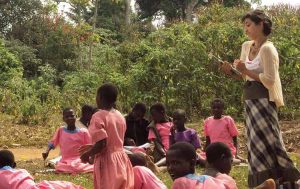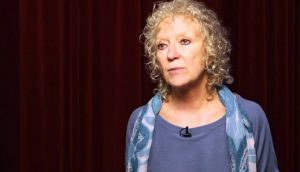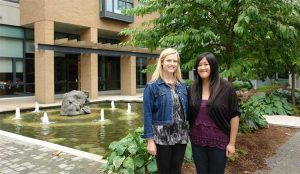Meet Stephanie Charlie: Pursuing education to serve
When her first nation signs its first-ever treaty, Stephanie Charlie wants to be there. “I want to help my community,” says Charlie, a graduating UBC Arts student and member of Cowichan Tribes, one of Canada’s largest First Nation communities, located in Duncan on Vancouver Island. “That is why I plan to run for councilor in our next election.
Learning by Doing: Arts Students Travel to Uganda
For twelve students this summer, the classroom is going global. When course work meets citizenship, the result is Sociology 435. The course integrates regular classroom-based teaching with experiential learning, connecting theoretical knowledge to everyday practices and encouraging students to be responsible citizens globally and locally.
GRSJ Professor Veronica Strong-Boag wins prestigious SSHRC Award and Fellowship
By Loren Plottel UBC Professor Veronica (Nikki) Strong-Boag has been awarded the Jules and Gabrielle Leger Research Fellowship from SSHRC for her study of an exceptional Canadian “power couple.” “An Edifying Couple: Lord and Lady Aberdeen, Liberal Aristocrats, Reformers, and Viceregal Activists in an Imperial World (1877-1939)” is the title of the project that won […]
Meet Travis Allan and Bryn Runkle: Using Social Science to research the implications of the Kyoto Protocol
Students Travis Allan and Bryn Runkle use their training in the Social Sciences in their jobs as research assistants in the Faculty of Land and Food Systems.
Where carbon cash flows, and international intrigue coincide, there you will find Arts undergraduate students Travis Allan and Bryn Runkle. Hailing from the International Relations Program and the Department of Economics respectively, Travis Allan and Bryn Runkle are using the skills they’ve learned in Arts to help an agricultural sciences professor study some of the implications of the Kyoto Protocol. “Other faculties don’t always have people with the skills we learn in Arts,” says Runkle. “The fact that we are in Arts allows these professors to tap into different sources of expertise.”
After searching for research opportunities on campus, Allan and Runkle secured positions with Professor Katherine Baylis, a professor of food and resource economics who teaches in the Faculty of Land and Food Systems at UBC.
Baylis says she had never hired undergraduates as research assistants before meeting Allan and Runkle. But she was quickly impressed with the skills of both students. “I was very lucky with both Travis and Bryn,” she says. “Very good students, very intelligent.”
Coffee and Carbon Training
Under Baylis’s guidance, Allan and Runkle have taken part in several long-term research projects over the past year, exploring subjects ranging from the legal acrobatics of the softwood lumber dispute to the actual fairness of Fair Trade coffee. More recently, they’ve been studying a process known as carbon trading, one of the procedures put forward by the 1997 Kyoto Protocol to reduce greenhouse gas emissions. As Allan explains, carbon trading allows a company emitting less than its quota of greenhouse gases to sell “credit” to another company that is exceeding theirs.
It might be very expensive for a factory owner to make the necessary structural changes to reduce emissions in his own plant, says Allan. By the rules of the carbon trading system, however, he could pay a farmer to adopt low-till plowing methods, which keep more greenhouse gasses trapped in the soil. The result would be the same overall reduction in high-atmosphere emissions, at a potentially much lower cost.
The process becomes more complicated in cases where the companies engaged in trading are based in different countries and governed by different laws. It’s this type of study that depends on Allan and Runkle’s backgrounds in political science and international economics. “A lot of the time it’s trying to sleuth down information in terms of what the governments are doing, because it’s not necessarily transparent,” says Allan. “When you’re looking at governments, it’s not as cut and dry as just saying, ‘Oh, we have strong property rights.’ or ‘Oh, the law says this.’”
“My International Relations and Political Science training has been really invaluable at providing me with deeper insights.”
Realizing the Relation between Research and Arts
Before they began working, however, neither Allan nor Runkle were sure there was a market for these kinds of skills in a research position. “I thought research was only something that Science students did,” says Allan.
But having developed a rapport with a number of professors during their third year, Allan and Runkle began asking around to see if any them would hire undergraduates to do research work. After several months of trying, both students succeeded in obtaining research positions with Baylis, and have been working with her ever since.
Allan and Runkle agree that the skills they’ve developed doing research for Baylis will be of great use to them in their further studies; Runkle in his Economics Honours degree at UBC, and Allan at the University of Toronto Law School.
In giving advice to undergraduate students looking for research work, Baylis suggests taking the initiative and approaching professors directly. “Going in and asking and being a bit proactive about it is useful, because most of the time money comes from grant applications, and professors don’t necessarily think to request specific funding unless they’ve been approached,” says Baylis. “Totally believe in yourself,” adds Runkle.
Meet BA ’06 Cait McKinney: Uncovering subversive and politically charged historical valentines
Sending valentines may not be the most obvious method of political campaigning, but it was one of the ideas adopted by the Congressional Union for Woman Suffrage in their campaign for the vote.
Cait McKinney (BA English Honours, ’06) came across these witty and pointedly political historical records as part of a research project completed for the English honours seminar she took in her final semester of study at UBC with Professor Mary Chapman.
Political Persuasion
The valentine cards, sent to anti-suffrage American congressmen and President Thomas Woodrow Wilson on Valentine’s Day 1916, are personally tailored messages that used tongue-in-cheek rhymes and cartoons to advocate for suffrage. McKinney’s project and website includes reproductions of the previously unpublished valentines accompanied by critical annotations and an essay.
Working With Experts
To compile it, McKinney worked closely with the Sewall-Belmont House and Museum in Washington, DC, dedicated to the evolving role of women and their contributions to society through the continuing story of women’s pursuit for equality. Museum staff helped McKinney track down some of the valentines, and also scanned these for the project. The Sewall-Belmont House recently featured McKinney’s website in their online newsletter, a publication that reaches more than 2,500 readers.
“I wanted the students to experience, even vicariously, the thrill I have when I go to the archives and snoop around and find things,” says Professor Chapman, who taught the research-based seminar on American suffrage print culture. Prior to teaching the course, Chapman had conducted research in Sewall-Belmont House archives.
Primary Research A Great Learning Opportunity
“Most of the research that we get to do as undergrads is a new take on things that have already been done,” adds McKinney, who welcomed the opportunity to tackle research involving primary sources and then present her findings using the web. “Dr. Chapman wanted us to explore how we could use the Internet as a tool for letting other people gain access to either research that has not gotten a lot of attention, or is in danger of effectively going out of print,” McKinney says. “That’s particularly a big issue when you’re talking about women’s history because sadly there’s still not a lot of money devoted to publishing this kind of stuff,” she adds.
When McKinney first signed up for the honours seminar, she thought studying the suffrage movement would be a drag. Her original research gave her the chance to find an angle that interested her — the valentines and their representations of female sexuality. “It’s an example of how suffragists were really cunning in the way that they formed their arguments and eventually managed to win the vote by appealing to men on their own terms,” said McKinney. “They’re playing with the male idea of woman-as-object to be sexually conquered —they’re throwing it back in their critics’ faces. That’s why these valentines are so subversive and so effective: because they take the argument that was always thrown at feminists during that time period — that women were to be controlled and used by men and were not suited to voting — and make it their own.
More about McKinney
McKinney was a well-known undergraduate at UBC — she edited the AMS Insider, the student planner that is distributed to students every year. She also worked at the wellness centre as a peer educator and was active with the UBC Film Society as advertising manager and social coordinator. While she has plans to get back to school to pursue graduate studies in cultural theory, in the long term, she plans to continue doing what she’s doing now — writing with a youth focus. She currently works as a writer and researcher for Free The Children in Toronto, an international charity that seeks to raise awareness of global poverty amongst youth, and empower young people to realize that they can have an impact on the world.
By Alexandra Chu, BA ’07 in English Literature and a minor in History.
Meet alumnus Robert Parungao: Finding video games rife with stereotypes
Robert Parungao, who graduated from UBC with a BA in sociology, spent eight months analyzing the storylines and characters of four popular video games, finding stereotypes generally condemned in other entertainment media. “These images have gone unchallenged for the past 20 years or more,” says Parungao, who completed this eight-month analysis for his honours thesis.
Asian characters as Antagonists
Parungao’s analysis found Asian characters are consistently modeled on antagonistic stereotypes, such as kung fu warriors or faceless, yellow-skinned victims. “I think that, in many ways, they’re saying what a lot of people want to be hearing, because society has that inherent racism still, that’s kind of masked.”
The video game industry currently generates more than US $30 billion a year in worldwide sales, surpassing the motion picture industry in profits. In Canada, 35 per cent of households — and nearly 50 per cent in the U.S. — own a video game console.
Robert’s Research of Popular Video Games
For his study, Parungao looked at four titles that span two decades of video game design — Kung Fu, Warcraft 3, Shadow Warrior and Grand Theft Auto 3. He analyzed the storylines and characters, and spent 100 hours playing the games.
Grand Theft Auto has been a best-selling franchise for more than 10 years, says Parungao, and features non-white characters that are mainly triad members, yakuza gangsters, Latino gangs, or black hoods. “These stock characters are seen in a lot of games and function as narrative obstacles to be overcome, mastered or ultimately blown to smithereens by the white hero.”
Further, Parungao says games designers like to use a mix-and-match grab bag of Asian stereotypes that are often nonsensical. “The villain in Shadow Warrior goes by a Chinese name, Lo Wang. But when he fires his rocket launcher at his enemies, he screams ‘Just like Hiroshima.'”
Video Games Behind the Times in Cultural Sensitivity
Parungao believes video games have not kept pace with the changes seen in other entertainment media. “Film and television come under greater critical scrutiny, so civil rights and minority groups can voice their concerns and effect some change,” he explains. “But video games have generally been seen as kids’ toys. There aren’t the same mechanisms or critical forums to encourage game designers to evolve.”
Parungao says he believes that video games as an interactive media have a far greater impact than movies or sports, which are passive and observational.”It’s very different for a 15-year old boy to see stereotypes in a movie like ‘Breakfast at Tiffany’s,’ where Mickey Rooney plays a bucktoothed Japanese character, versus entering the world of Grand Theft Auto, where you can walk into Chinatown and start mowing down Chinese gangsters with an AK-47.”
“I hope to continue looking into ways to improve video games because they’re fun and I’d like to see them turn into positive media instead of negative ones.”
Cognitive Systems: “A unique interdisciplinary experiment”
According to Rebecca Weiss, a recent grad Cognitive Systems, a lot of UBC students picture their counterparts in Cognitive Systems creating intelligent robots that will one day rule the world. In reality, the multi-disciplinary undergraduate program teaches students the principles and techniques used by intelligent systems – both natural and artificial — to interact with the world around them.
Meet Alvin Singh: Building a unique degree
The interdisciplinary studies program has allowed Alvin Singh to customize his education. His program is centered on three core components: political science, international development, and policy studies. “A specialized education doesn’t always give you the skills necessary to function properly in a flexible work environment. More and more I’m finding that the jobs I’m attracted to — jobs that a lot of young people are attracted to — are extremely flexible.”
Meet Juliette Link: Combining Psychology & Computer Science
Since the fall of 2006, Arts students have had the option of gaining expertise in computer science in the context of a BA degree, thanks to a the Computer Science major in the Faculty of Arts. The rationale for the program is simple: in a world where the digital arts are taking off, machine utilization is gaining ground and humans have increasingly diverse interactions with technology. Not surprisingly, there’s a surge of interest in computer science experts who can cut across disciplines.
Meet Karrmen Crey and Amy Perreault: Creating change through storytelling
As a directed studies project in the First Nations Studies Program, Karrmen Crey and Amy Perreault recently completed What I Learned in Class Today, a film documenting the responses of nine students to intentional and unintentional occurrences of racism.
Karrmen Crey and Amy Perreault say their video project began as a vent session in a course they were taking with First Nations Studies Professor Linc Kesler.
“We would start the class by telling stories about classes we were in,” relates Crey, a recent graduate of the program.
The stories, she adds, were a way of dealing with some of the offensive and ignorant statements they had heard about Aboriginal people — not on the street, but right in their classes at UBC.
“They were kind of funny, they were, of course, kind of absurd,” Crey says of the remarks of some UBC students and professors.
The statements were profoundly hurtful, often for no other reason than the fact that non-Aboriginal students sometimes forget that in talking about the historic challenges faced by Canada’s First Nations, they are talking about issues that Aboriginal students among them have experienced themselves.
Noting a pattern, Kesler observed that it would be a good idea to gather the stories of Aboriginal and non-Aboriginal students alike.
That suggestion lit a fire under Crey and Perreault — both senior undergraduate students at the time. They were highly interested in developing a resource that would help fellow students and faculty discuss sensitive inter-cultural issues without hurting, or alienating people.
As a directed studies project in the First Nations Studies Program, Crey and Perreault recently completed What I Learned in Class Today.
Video, they discovered, was a perfect medium, especially for getting uncomfortable first-person experiences out in the open.
They’ve screened a preliminary version of the video at several forums, including UBC’s Realities of Race conference in March 2007. In each case, audience members have been struck by the honesty of the students, who express their stories in their own words.
“You read a report, you can look at statistics, but actually being faced with students at UBC right now who are experiencing these things is pretty powerful.”
Dara Kelly is one Aboriginal student interviewed in the film. A member of the Fraser Valley Le’qa:mel First Nation, Kelly was in an English class with a focus on Aboriginal authors last year when one student prefaced a group discussion by asking why Aboriginal people were so “screwed up.”
For Kelly, that comment felt like a slap in the face, and in the film she candidly discusses why she finds the remark totally unacceptable.
“At the same time, when that kind of incident happens, it’s almost so shocking, or unbelievable, or hurtful that nobody says anything, and nobody knows what to do,” she says.
That’s one of the reasons Crey and Perreault created the video in the first place — the aim is to talk about these discussions, and to acknowledge that these aren’t just difficult for Aboriginal students.
People may recognize that something is racist, or insensitive, but not know what to do, or say, underscore Crey and Perreault.
Crey and Perreault say they intend to widen the scope of the project and add more interviews, as well as related classroom material, to accompany the film.
With the broad goal of removing an institutional barrier to Aboriginal post-secondary education, they plan on crafting their project to make it a resource for teachers at UBC and other institutions, something relevant to larger, multi-ethnic audiences.
“This video is here and it’s available,” Perreault says, “so let’s start talking about it instead of not talking about it, or talking about it in the hallway after class.”
———
By Bryan Zandberg (BA, 2006, in French and Spanish). Bryan is a former editor with The Ubyssey.



